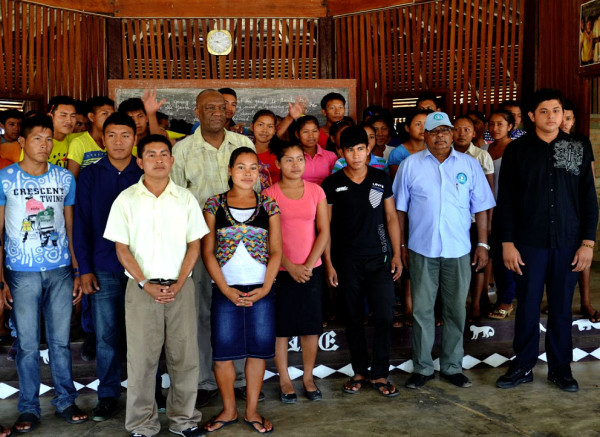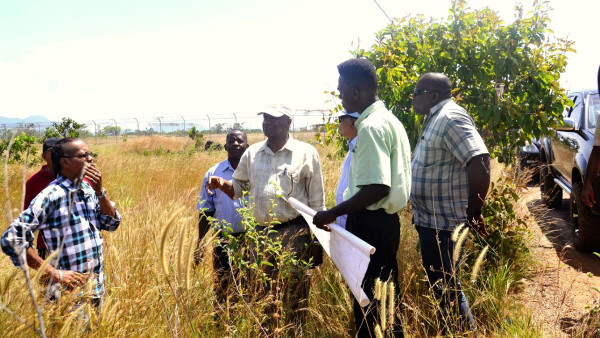El Niño conditions are expected to continue for the remainder of the year and there is an over 50% chance that it could last till June next year.
In a statement, the Ministry of Agriculture said that according to the El Niño/Southern Oscil-lation (ENSO) diagnostic discussion issued by the Climate Prediction Center and the International Research Institute for Climate and Society last week, there is a 95% chance that the Northern Hemisphere will experience El Niño conditions that will continue for the remainder of the year, and a 55% chance it will last into the second quarter of 2016. It said that El Niño is expected to gradually weaken during April to June 2016.
As it relates to Guyana, the ministry said that the latest data from regional organisations show that for the remainder of the year, there is a great percentage probability of below normal precipitation.

As such, the Hydro-meteorological Service is advising that the appropriate water management practices be employed in the various sectors and households to mitigate against the forecast deficit in rainfall quantities and increase in atmospheric temperatures in the coming months. The ministry said that water availability is likely to be reduced.
It noted that the forecast conditions does not mean that there would be a complete absence of rainfall but rather a reduction in the average quantities of rainfall that is expected to be observed at the various recording stations across the country. Further, under these conditions, it is also still highly probable to experience periods of high intensity short duration rainfall which are difficult to predict and may result in flash flooding in high risk areas, the statement said.
Meantime, Minister of State Joseph Harmon visited some Region Nine communities on Wednesday, and in a statement, the Ministry of the Presidency said that he committed the government’s support to the region to ensure that the impact of the impending dry season is vastly minimised and long term solutions are found.
According to the statement, residents were able to provide their recommendations and offer possible solutions, which can be implemented by government to ensure that in the long run, the Region does not become severely affected during the dry months.
Warehouse
It said that the Minister committed immediate support through the Civil Defence Commission (CDC) to ensure the provision of purification tablets, water tanks and other related materials to combat the effects of the season, while the building of a warehouse in Lethem for the storage of food and other needed items is actively being pursued. Harmon assured the residents that the new administration will not neglect the communities, but will work assiduously to bring relief where needed.
“As your government, we are your servants. We are here today to ensure that the service, which we provide to you, is a service that is of high quality. I came here because I am your servant. If there is a problem that affects you or any other person in this country, it is our responsibility to respond to it and we will do so diligently,” he was quoted as saying.
Harmon stopped first at Bina Hill in North Rupununi, where he met officials from the North Rupununi District Deve-lopment Board (NRDDB), Surama, Aranaputa, Kwatamang and Rupertee and heard of the issues currently being faced by that district in relation to the dry season.
Randy Gilbert, the vice-chairman of the NRDDB told Harmon that the villages and the entire region, battle during these months to ensure that that there is enough water for basic needs such as cooking, washing and bathing, the statement said. According to the statement, Gilbert said that the cattle and farms are often neglected and losses are incurred, since the water supply is not sufficient to sustain farming activities.
The NRDDB representative said that central government’s help and support is immediately needed.
Deeper wells

“Each year, there is a shortage of water during this season and we cannot allow it to persist as it is. We need deeper wells. Each community should and have to get deeper wells. The wells we currently have are too shallow and not all communities have them so we really need to look at this. The residents are willing to dig deeper wells but we need support from the government,” Gilbert was quoted as saying.
In Lethem and Sand Creek, Harmon met with Regional Vice-Chairman Karl Singh, representatives of the community, Neigh-bourhood Democratic Council (NDC), Guyana Lands and Surveys Com-mission (GL&SC) and other government agencies, where similar sentiments were also expressed.
The ministry said that the call was reiterated for deeper wells to be dug so that a larger volume of water can be stored to sustain the needs of the communities during this period of the year. It was also stated that there is a need for the provision of water tanks and other large storage apparatuses so that water can be conserved and managed during the wet season. Residents also suggested that ‘Water Committees’ be set up in the communities to ensure that the valuable resource is carefully managed. They also called for the provision of dry season cassava sticks to protect the livelihood of farmers, the statement said.
Harmon, in response, said that while the government will be looking to put short and medium term solutions in place for immediate relief, there is need for a long term plan so that the problem is not revisited every year.
“I have no doubt that we can respond with immediate relief but we have to look at the help that we can give to the communities. We need to ensure that we can respond to the changes [in] climatic conditions. Climate change is a real issue and not a paper matter and we are seeing the effects of it,” he told residents.
He added that when government spends money, it must be able to assist residents, not only through the current issues but these decisions must also be made with longer term solutions in mind.
“It is these situations that justify how Government spends money. We want to see how best we can help for the long term so that the residents are not affected in a severe way. We treat all of Guyana the same way and if there is a problem here, we must find a solution to that problem. Yes, short term fixes are okay, but we cannot keep coming back to the same problems year after year and subject our citizens and residents to this and so we need to find solutions to them,” he asserted.
Merits
The statement said that Harmon related that government will begin investigations into the merits of the recommendations made by the residents to see which can be immediately implemented. He also said that Guyana will begin using overseas conferences and trips to seek advice and help in combating the situation and finding solutions.
“We will have to invest in research and development in all of our related ministries to ensure that we don’t spend money on trial and error; that we can spend in technology that can provide you with a certain level of certainty,” he told officials and residents.
The government too, he said, will examine the feasibility of a water treatment plant as well as water resource management plans for the Region.
In the meantime, the Education Ministry has begun monitoring attendance of children in school while awareness programmes on the conservation of water have also begun, the statement said.
The visit was spearheaded by the CDC’s Disaster Management team, along with support from the Ministries of Communities and the Indigenous Peoples’ Affairs. Among the delegation was Director General of the CDC, Colonel Chabilall Ramsarup, Sherie Samantha Fedee, Deputy Permanent Secretary, Ministry of Indigenous Peoples’ Affairs, Marlon Daniels, Ministry of Communities, Major Sean Welcome, Operations and Training Officer at the CDC and Lieutenant Colonel Godfrey Bess, Staff Officer in the Defence Secretariat, Ministry of the Presidency.




